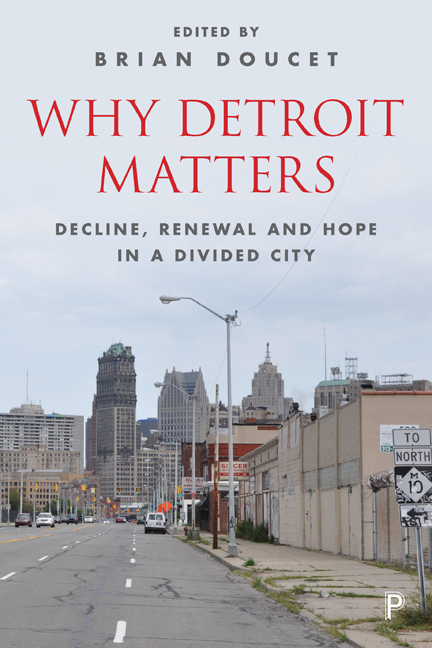Book contents
- Frontmatter
- Contents
- List of contributors
- List of figures and tables
- Acknowledgments
- one Introduction: why Detroit matters
- Section One Lessons from Detroit
- Intermezzo I You may not know my Detroit
- Section Two Practices from Detroit
- Intermezzo II My Detroit
- Section Three Conversations from Detroit
- References
- Index
fourteen - Make sure you are helping: experts, solidarity, and effective partnering with locals
Published online by Cambridge University Press: 05 April 2022
- Frontmatter
- Contents
- List of contributors
- List of figures and tables
- Acknowledgments
- one Introduction: why Detroit matters
- Section One Lessons from Detroit
- Intermezzo I You may not know my Detroit
- Section Two Practices from Detroit
- Intermezzo II My Detroit
- Section Three Conversations from Detroit
- References
- Index
Summary
From Williams’ “resident majority,” we move on to another local perspective from Detroit. In 2009, Drew Philp bought an abandoned house on the East Side of Detroit for $500, renovated it, and turned it into his home where he currently resides. Detroit attracts no shortage of attention and many people come to the city with the intention of helping. Living where he does, Drew often encounters such people, an experience he illustrates in the chapter's opening vignette. However, Philp questions some of their intentions; using William Easterly's distinction between “searchers” and “planners,” he differentiates between people coming in to implement their own ideas versus those who arrive willing to listen and contribute to the efforts of those who are already there. Through a combination of his own experiences and his work as a writer, journalist, and educator, Philp reflects on five common practices of overlooked and unexamined biases he is keen for people to avoid when entering into a new place and seeking to contribute to life and activity therein. His message resonates with many other voices in the book; the idea of the “blank slate mentality” that many outsiders have when entering Detroit will be picked up in conversations with the founders of the Boggs School (Chapter Twenty-three), which is coincidentally in the same neighborhood as Philp's home. While this critique is often aimed at visitors and new incoming and often wealthier residents, scholars, researchers, and educators can also learn from Philp, and other Detroiters, about how to enter a community, engage with it, and, hopefully, contribute to the activities and endeavors already going on there.
Drew Philp is a freelance writer and journalist from Detroit. His work has appeared in the Detroit Free Press, Metro Times, Bakersfield Californian, and The Guardian. His Buzzfeed article “Why I bought a house in Detroit for $500” was read more than 1.5 million times. His memoir of building his house and living in Detroit, A 500 House in Detroit: Rebuilding An Abandoned Home and An American City will be published by Scribner April 11, 2017.
Introduction
Once [Gay] People began to say who they were, you found it was your next door neighbor or it could be your child, and we found people that we admired. That understanding still doesn't exist with race. You still have separation of neighborhoods where races are not mixed.
- Type
- Chapter
- Information
- Why Detroit MattersDecline, Renewal and Hope in a Divided City, pp. 249 - 258Publisher: Bristol University PressPrint publication year: 2017



